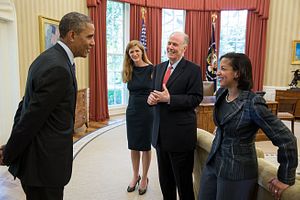U.S. National Security Advisor Susan Rice will visit China for three days starting September 7, the White House announced earlier this week.
The U.S. announced Rice’s upcoming trip in a press release attributed to National Security Council Spokesperson Caitlin Hayden. Hayden said in the release that Rice would be in Beijing from September 7-9, and would meet with senior Chinese officials, including State Councilor Yang Jiechi. In these meetings, Rice plans to consult with her Chinese counterparts “on a range of bilateral, regional, and global issues.” Hayden added that Rice intends to “underscore the United States’ commitment to building a productive relationship between our two countries in advance of the President’s visit to China in November.”
This will be Rice’s first visit to China since becoming Obama’s national security advisor in 2013. Chinese officials confirmed the trip and said that Rice was visiting at the invitation of State Councilor Yang.
The main purpose of Rice’s visit is likely to be hammering out the details of the bilateral summit Presidents Xi Jinping and Barack Obama are planning to hold in China in November after the APEC meeting. The Sino-American presidential meeting is expected to be informal, the successor to the Sunnylands summit they held in the United States last spring.
In reporting on the upcoming visit, most state-run media outlets in China also portrayed the trip as an attempt by Rice to repair her personal image with Chinese officials. These articles said that Rice “drew much criticism” for her stinging rebukes of China’s Syria policy during her time as U.S. ambassador to the United Nations. According to a commentary attributed to Xinhua writer Li Li, however, since becoming national security advisor, “the former hard-line diplomat has apparently come to realize the utmost significance of a normal and constructive China-U.S. relationship.”
In truth, Rice has been remarkably absent (at least publicly) from the Obama administration’s Asia policy, including its China policy. Last November, she did give what was billed at the time as a major address on the administration’s Asia policy to students at Georgetown University in Washington, DC. The speech didn’t break any new ground, however, and Rice has, with some exceptions, kept a low profile in the region since.
Chinese media also said the two sides would use Rice’s trip to try and smooth over some of the recent rough patches in the bilateral relationship, most notably China’s recent “dangerous intercepts” of U.S. spy planes flying in international airspace over the South China Sea.
The Xinhua editorial mentioned above, echoing other recent commentaries coming out of China, also took issue with President Obama’s recent comment calling China a “free rider” in Iraq. “What is also worrying is that the U.S. leadership has apparently followed a bad tradition of taking China as scapegoat for its own messy domestic and foreign policies, while overlooking the big picture of China-U.S. relations,” the commentary said.
It concluded by saying that Rice’s trip comes at a “particularly critical time when it is of great urgency for the United States reaffirm its commitment and sincerity to Beijing by treating it as a true partner.” As the president’s “right hand,” the Xinhua commentary said Rice is “obliged to sort out sense and sensibility for the U.S. leaders so as to construct a truly stable major-country relationship.”

































